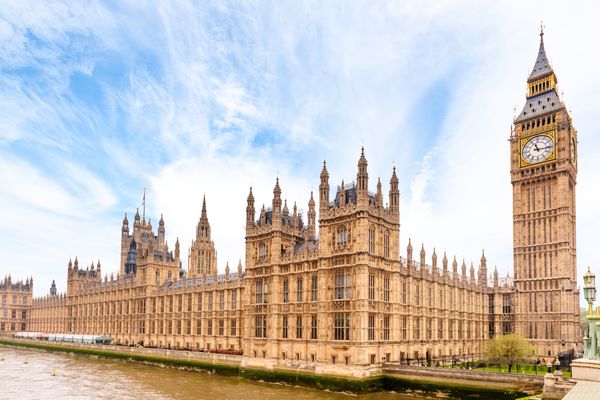1.1.6
Case for Democratic Reform
The Case for Democratic Reform
The Case for Democratic Reform
There have been some calls for democratic reform in the UK, as institutions may not represent the public to the best of their ability.


Democratic deficit
Democratic deficit
- Democratic Deficit is the belief that democracy is not working as intended and is failing to ensure sufficient accountability and legitimacy.
- In the case of the UK, this refers to problems with representative democracy in practice.


Example case: low voter turn out
Example case: low voter turn out
- UK election turnout fell after 1997 (although has started rising again).
- Election turnout is incredibly low in elections other than general elections, such as European Parliament elections and local elections- 35.6% in the 2014 EU parliament election.


Example case: The voting system
Example case: The voting system
- FPTP creates a two-party system. Parties with no large, country-wide base find it hard to gain seats.
- The two main parties can win less than 40% of the vote but win a majority of seats.
- FPTP creates ‘safe’ seats, where one party is almost certain to win. Opposition voters may feel their interests are unrepresented.
- In votes with many candidates, the popular vote may split, and a candidate with a low vote may win.
- In Belfast South in 2015, the winning candidate had 24.5% of the vote.


Example case: Institutions
Example case: Institutions
- The House of Lords has a mostly unelected membership. Some peers are hereditary peers, and inherited their title. The house doesn’t share many of the characteristics as the UK public, and costs taxpayers money.
- The Supreme Court is another unelected institution with power to challenge laws.


Example case: The EU
Example case: The EU
- EU regulations are binding and member states don’t get to pick and choose the ones they want to obey
- For example, free movement of labour means that governments can’t restrict immigration from the EU.
- There have been several movements across Europe to leave the European Union as a result.
- Accordingly, the UK voted to leave the EU in 2016 (Brexit).
Types of Democratic Reform
Types of Democratic Reform
There are several types of proposed reform which address different problems of UK democracy.


Electoral reform
Electoral reform
- Some believe it is time to change the voting system, for example away from First Past the Post to the Alternative Vote system.


House of Lords Reform
House of Lords Reform
- Some people want to reform the House of Lords because it is not elected, and so not representative of the people, but has an important say in legislation passed.
- The Liberal Democrats have proposed introducing an elected second chamber (for example, a senate).


Online voting
Online voting
- Currently, voting in UK elections involves the time and money of setting up polling stations and providing physical resources.
- Online voting from phones and computers could reduce these costs.
- As well as this, voters may find it difficult to turn up to polling stations, especially if they cannot take time off work.
- Online voting is more likely to engage with younger voters and people too busy to vote - so might increase election turnout.


Compulsory voting
Compulsory voting
- Having voting as a legal duty, and fining people for not voting is a way of increasing turnout, making election results more representative of the entire electorate.
- In Australia, compulsory voting exists, and turnout is usually around 95% at elections


Lowering the voting age
Lowering the voting age
- Many argue that 16-18-year-olds are citizens that should have parliamentary representation.
- In Scotland, legislation was passed in 2015 to allow 16-year-olds to vote in Scottish elections.
- 16-year-olds were allowed to vote in the 2014 Independence Referendum.
The Case Against Reform
The Case Against Reform
There are several reasons to oppose electoral reform. There are many institutions that are able to hold politicians to account, and so there may not be a pressing need for reform.


Importance of pressure groups
Importance of pressure groups
- Pressure groups allow the representation of minority interests and scrutinise the government.
- Pressure groups inform the public of key issues, and engage the public in politics.


No demand for major reform
No demand for major reform
- Changes to the voting system have been rejected - major House of Lords reform was rejected in 2012 by the coalition government, and in 2011 the public voted against AV.


Media scrutiny
Media scrutiny
- The media acts to scrutinise politics and holds politicians to account.
- This is an effective way of monitoring UK politics and informing voters.


Election participation
Election participation
- In the UK electoral participation is at a similar level to other Western democracies.
1Democracy & Participation
1.1Representative & Direct Democracy
1.2Wider Franchise & Suffrage
1.3Pressure Groups & Other Influences
2Political Parties
2.1How Political Parties Work
2.2Established Political Parties
2.3Emerging & Minor Political Parties
3Electoral Systems
3.1Different Electoral Systems
3.2Referendums & How They Are Used
4Voting Behaviour & the Media
5Conservatism
5.1Conservatism: Core Ideas & Principles
5.2Conservatism: Differing Views & Tensions
6Liberalism
6.1Liberalism: Core Ideas & Principles
6.2Differing Views And Tensions Within Liberalism
7Socialism
7.1Socialism: Core Ideas & Principles
7.2Differing Views And Tensions Within Socialism
8The UK Constitution
8.1Nature & Sources of UK Constitution
8.2Constitutional Change since 1997
8.3Role & Powers of Devolved UK Bodies
9The UK Parliament
9.1Houses of Parliament
9.2Comparative Powers
9.3Legislative Process
10The Prime Minister & the Executive
10.1The Executive
10.2Ministerial Responsibility
10.3Prime Minister & the Cabinet
10.3.1Role of the Prime Minister
10.3.2Prime Minister's Powers
10.3.3Limits on the Prime Minister's Powers
10.3.4Role of the Cabinet
10.3.5Prime Minister & Cabinet: Relations
10.3.6Prime Minister & Cabinet: Balance of Power
10.3.7Prime Minister & Cabinet: Case Studies
10.3.8End of Topic Test - PM & Cabinet
10.3.9Top Grade AO3/4 - PM & Cabinet
11Relationships Between Government Branches
11.1The Supreme Court
11.2Parliament & Executive Relations
11.3The European Union & the UK
11.4Sovereignty in the UK Political System
12US Constitution & Federalism
12.1Nature of the US Constitution
12.2Principles of the US Constitution
12.3Federalism
13US Congress
13.1Structure of Congress
13.2Functions of Congress
14US Presidency
14.1Presidential Power
14.2The Presidency
14.3Interpretations & Debates of the US Presidency
15US Supreme Court & Civil Rights
15.1Nature & Role of Supreme Court
15.2Supreme Court Appointment Process
15.3The Supreme Court & Public Policy
15.4Protection of Civil Liberties & Rights
15.5Debates & Interpretations of the Supreme Court
16US Democracy & Participation
16.1Presidential Elections
16.2Electoral College
16.3Electoral Campaigns
16.4Incumbency
16.5Democrats & Republicans
16.6Internal Conflict & Ideology
16.7Support & Demographics
17Comparing Democracies
17.1Theoretical Approaches
17.2UK & USA Similarities & Differences
17.2.1Constitution: Nature
17.2.2Constitution: Provisions & Principles
17.2.3Federal System & Devolution
17.2.4Legislative: Lower Houses of Government
17.2.5Legislative: Upper Houses of Government
17.2.6Legislative: Powers & Functions
17.2.7Executive
17.2.8Supreme Court
17.2.9Supreme Court: Judicial Independence
17.2.10Civil Rights
17.2.11Civil Rights: Interest Groups
17.2.12Party Systems & Parties
17.2.13Campaign Finance & Pressure Groups
17.2.14End of Topic Test - Comparing UK & US
17.2.15Application Questions - UK & USA
18Feminism
18.1Feminism: Core Ideas & Principles
18.2Different Types of Feminism
19Nationalism
19.1Nationalism: Core Ideas & Principles
19.2Different Types of Nationalism
Jump to other topics
1Democracy & Participation
1.1Representative & Direct Democracy
1.2Wider Franchise & Suffrage
1.3Pressure Groups & Other Influences
2Political Parties
2.1How Political Parties Work
2.2Established Political Parties
2.3Emerging & Minor Political Parties
3Electoral Systems
3.1Different Electoral Systems
3.2Referendums & How They Are Used
4Voting Behaviour & the Media
5Conservatism
5.1Conservatism: Core Ideas & Principles
5.2Conservatism: Differing Views & Tensions
6Liberalism
6.1Liberalism: Core Ideas & Principles
6.2Differing Views And Tensions Within Liberalism
7Socialism
7.1Socialism: Core Ideas & Principles
7.2Differing Views And Tensions Within Socialism
8The UK Constitution
8.1Nature & Sources of UK Constitution
8.2Constitutional Change since 1997
8.3Role & Powers of Devolved UK Bodies
9The UK Parliament
9.1Houses of Parliament
9.2Comparative Powers
9.3Legislative Process
10The Prime Minister & the Executive
10.1The Executive
10.2Ministerial Responsibility
10.3Prime Minister & the Cabinet
10.3.1Role of the Prime Minister
10.3.2Prime Minister's Powers
10.3.3Limits on the Prime Minister's Powers
10.3.4Role of the Cabinet
10.3.5Prime Minister & Cabinet: Relations
10.3.6Prime Minister & Cabinet: Balance of Power
10.3.7Prime Minister & Cabinet: Case Studies
10.3.8End of Topic Test - PM & Cabinet
10.3.9Top Grade AO3/4 - PM & Cabinet
11Relationships Between Government Branches
11.1The Supreme Court
11.2Parliament & Executive Relations
11.3The European Union & the UK
11.4Sovereignty in the UK Political System
12US Constitution & Federalism
12.1Nature of the US Constitution
12.2Principles of the US Constitution
12.3Federalism
13US Congress
13.1Structure of Congress
13.2Functions of Congress
14US Presidency
14.1Presidential Power
14.2The Presidency
14.3Interpretations & Debates of the US Presidency
15US Supreme Court & Civil Rights
15.1Nature & Role of Supreme Court
15.2Supreme Court Appointment Process
15.3The Supreme Court & Public Policy
15.4Protection of Civil Liberties & Rights
15.5Debates & Interpretations of the Supreme Court
16US Democracy & Participation
16.1Presidential Elections
16.2Electoral College
16.3Electoral Campaigns
16.4Incumbency
16.5Democrats & Republicans
16.6Internal Conflict & Ideology
16.7Support & Demographics
17Comparing Democracies
17.1Theoretical Approaches
17.2UK & USA Similarities & Differences
17.2.1Constitution: Nature
17.2.2Constitution: Provisions & Principles
17.2.3Federal System & Devolution
17.2.4Legislative: Lower Houses of Government
17.2.5Legislative: Upper Houses of Government
17.2.6Legislative: Powers & Functions
17.2.7Executive
17.2.8Supreme Court
17.2.9Supreme Court: Judicial Independence
17.2.10Civil Rights
17.2.11Civil Rights: Interest Groups
17.2.12Party Systems & Parties
17.2.13Campaign Finance & Pressure Groups
17.2.14End of Topic Test - Comparing UK & US
17.2.15Application Questions - UK & USA
18Feminism
18.1Feminism: Core Ideas & Principles
18.2Different Types of Feminism
19Nationalism
19.1Nationalism: Core Ideas & Principles
19.2Different Types of Nationalism
Unlock your full potential with Seneca Premium
Unlimited access to 10,000+ open-ended exam questions
Mini-mock exams based on your study history
Unlock 800+ premium courses & e-books